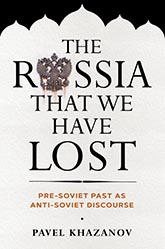|
The Russia That We Have Lost
Pre-Soviet Past as Anti-Soviet Discourse
Pavel Khazanov
“An original, significant, thought-provoking contribution that examines the discourse of the late Soviet mass intelligentsia about the pre-Soviet past and incisively illustrates its continued salience in contemporary Russian cultural politics.”
—Nancy Condee, author of The Imperial Trace: Recent Russian Cinema
In 1917, Bolshevik revolutionaries overthrew the tsar of Russia and established the Soviet Union under a new, communist government, one that viewed the Imperial Russia of old as a righteously vanquished enemy. And yet, as Pavel Khazanov shows, after the collapse of Stalinism, a reconfiguration of Imperial Russia emerged in Soviet culture. In hindsight, tsarist Russia began to appear not as a disgrace but as a glory, a past to recover and to deploy against what to many seemed like a discredited socialist project.
Khazanov’s careful untangling of this discourse in the late Soviet period reveals a process that involved figures of all political stripes, from staunch conservatives to avowed intelligentsia liberals. Further, Khazanov shows that this process occurred not outside of or in opposition to Soviet guidance and censorship but in mainstream Soviet culture that commanded wide audiences, especially among the Soviet middle class. Excavating the cultural logic of this newly foundational, mythic memory of a “lost Russia,” Khazanov reveals why, despite the apparently liberal achievement of the collapse of the Soviet Union in 1991, Boris Yeltsin (and later, Vladimir Putin) successfully steered Russia into oligarchy and increasing autocracy. The anti-Soviet memory of the pre-Soviet past, ironically constructed during the late socialist period, became and remains a politically salient narrative, a point of consensus that paradoxically attracts both contemporary regime loyalists and their would-be liberal opposition.
 Pavel Khazanov is an assistant professor of Russian at Rutgers University, where he teaches courses on Russian literature and history.
Pavel Khazanov is an assistant professor of Russian at Rutgers University, where he teaches courses on Russian literature and history.
Praise
“A beautifully written, and often moving, account of the construction of prerevolutionary Russian cultural memory in the late Soviet and post-Soviet periods. Khazanov’s documentation is rich, his analysis convincing, and his narrative engaging and compelling.”
—Alexandar Mihailovic, author of Illiberal Vanguard: Populist Elitism in the United States and Russia
“A fascinating and seminal study. . . . A welcome contribution.”
—Midwest Book Review
“A novel interpretation of the cultural foundations of the Putin era that is equal parts fascinating and convincing. . . . Impressive in its breadth and synthesis, the text makes a compelling case that the selection and celebration of a version of Russia with 19th-century aristocratic elitist values appealed to 20th-century Soviet intelligentsia and later Putin-era oligarchs.”
—CHOICE Reviews
“This is nuanced discourse analysis at its best.”
—Russian Review
Table of Contents
Contents
List of Illustrations
Acknowledgments
Note on Transliteration and Translation
Introduction
Chapter 1. Soviet Children, in Search of Imperial Grandparents: The Liberal Intelligentsia Subject and Its Historical Occlusions
Chapter 2. History Doesn’t Bear a Grudge: The Rightist Variation on the Neo-Imperial Intelligentsia Subject
Chapter 3. Dare You Come to the Square? Soviet Humanism and Neo-Decembrist Protest for the ITR Class
Chapter 4. The Intelligent Shall Become Narodnyi: The Rightist Variation on Soviet Humanism
Chapter 5. The Post-Soviet Stolypinist Project
Chapter 6. A Russia That They Have Lost? Anxiety and Immanent Critique of the Fascinated Stolypinist Subject
Afterword
Notes
Bibliography
Index
|

Larger images
November 2023
208 pp. 6 x 9
11 b/w illus.
|

